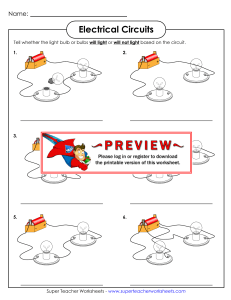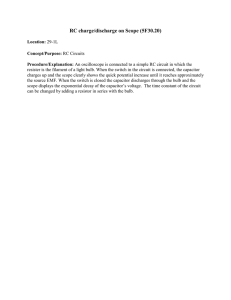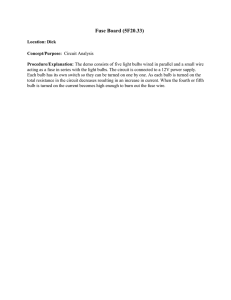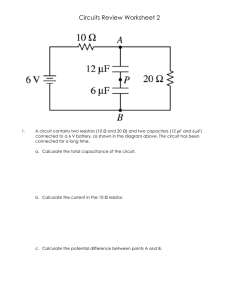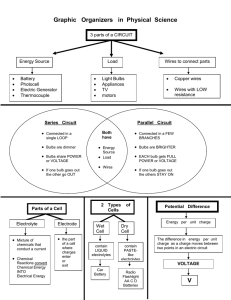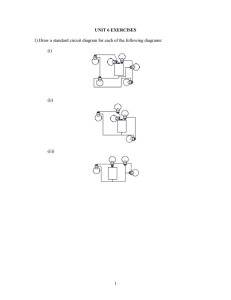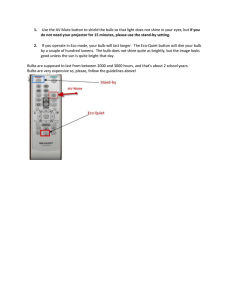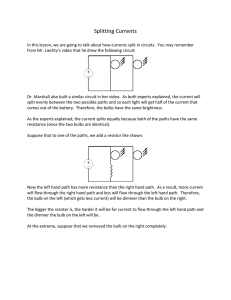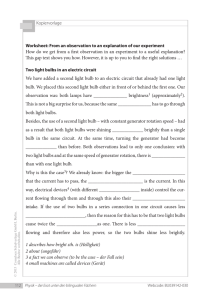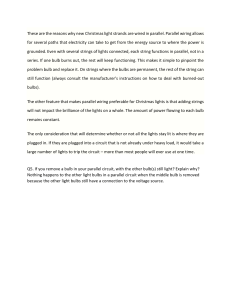Document 10915075
advertisement
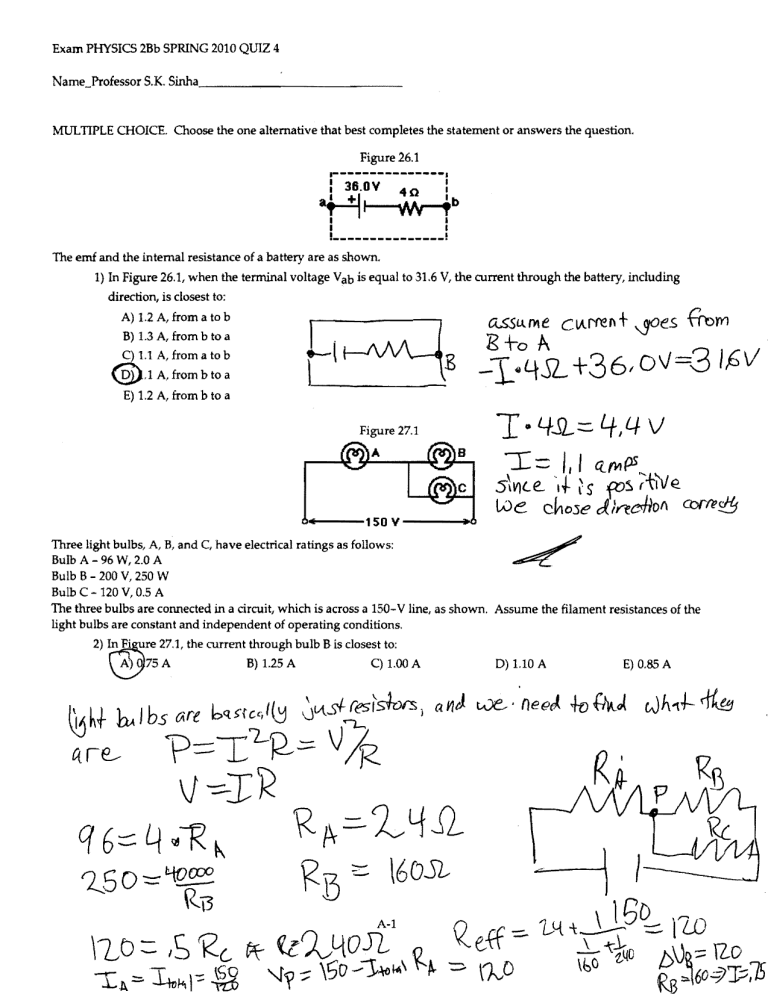
Exam PHYSICS 2Bb SPRING 2010 QUIZ 4
Name_Professor S.K. Sinha_ _ _~_ _ _ _ _ _ _ __
MULTIPLE CHOICE. Choose the one alternative that best completes the statement or answers the question.
Figure 26.1
~--------------J
: 36.0V
40
:
~t--Wv-fb
I
I
I
I_______________
!I
The emf and the internal resistance of a battery are as shown.
1) In Figure 26.1, when the terminal voltage Vab is equal to 31.6 V, the current through the battery, including
direction, is closest to:
rl~B
14
A) 1.2 AI from a to b
B) 1.3 A, from b to a
q
1.1 A, from a to b
@.1 A, from bto a
a..s:sLlrne
CIAN'e"
E+o A
+..jOes
f(-orn
-I-~4JL +36/0\1 3/,6V
E) 1.2 A, from b to a
T
LfSL== 414 V
T =: I, I ctf}llflS
Figure 27.1
0"
1S0V
... 0
II
SiV)Le.. "I~ (- S ~s ;t1Ve.
We choje JirtdtOA cort'tt!:J
~
Three light bulbs, A, B, and C, have electrical ratings as follows:
Bulb A - 96 W, 2.0 A
Bulb B - 200 V, 250 W
Bulb C - 120 V, 0.5 A
The three bulbs are connected in a circuit, which is across a 150-V line, as shown. Assume the filament resistances of the
light bulbs are constant and independent of operating conditions.
2)
~re
27.1, the current through bulb B is dosest to:
~75A
\!j ht 61 bs are
C(re.-
q
B) 1.25 A
bq,( Cq I~ 0V\..st-~Isks J (;L nJ tAJe-. neeJ.
V-==-yR
~50::=:~
Ri3
j
'R A=-1- YQ
\<-\-'-::::
\6CJJ2..
J.J
L D == IS 12(.. tt ~?v40Jl
A-I
Til. ""
+0 tittJ wh~t-~
~::::TL-R-.:::: V/1<­
q 6::::: Lj ~1< 1\
\
E) 0.85 A
D) LIO A
1.00 A
~f<.I-;: ~
n
"- eJf::::'
'-IF \So -"140..' R~ :;:, \'AP
~
I I
r.
\
i GD
~ -t[40
I){ -\: --------
rID
L>'V~\6oqT~J5
B:::: 120
RB
::::
V
Figure 27.5
J1'~R1
3) In Figure 27.5, the circuit R is a variable resistance. As R is decreased
~ tt st -5 -+'he .fes,-,~<.e c+
-tie pleas ~n p:>t~Ile.t d..ecfeaft.$ t~K" fhe
to-kl resis,kulte cLe.crea.$€. 5
~ II dedeases,I2 deereases.
o..s K-.
C!0decreases,I2increases.
.e II jncl'e:!te¥~. h dl""'11'8~.@iI.
-OPt
rt:meiTt!;ttft~~12 mereas@s.
\JJ~ kh .in c..1)!""Se.S +~e ne.+ c~r;e(l +­
E) II hlCxea5e!, 12 HtaemJe!. '.
ec
j
\f \>
N.4<)tl
c
J
(J-
cl £Il c{ 1hl:fS b.j
c,vt-
J
.
0 1.. i O\e c re 1l5~5.
wl..-+",J,kc,,.
"
--, ~ 4 ~ ~"6 h ot"es J. t:
0
POll)+- P
~ rK.£ l4.L.? ~e V of ~ €...
Cgr€4{'ir l=,!jr8;.[,..
J.e(rettsc:J..
IS
nO +e +htt+ s'in c...e T
~
r
b"~Ts~ .,""<" ""rOre..
.J I
-j.clFIgure 27.10
U,
~e
\
15 p.F
II'1e:FdJe
't't:J("l
th~J h
T'
20
l
I
MQ uV\..<A.
f. "
I1A.
r
­
I
'Va I h.y~~
.".t.fcc.rc~~ r J
1'5 n Ol..v I
"'.
ower
IS "'tJ I-je.,....
+Iz., I-io..J... 1:.z
v e. \rte..{'e" 5 e,
rnu.s.f­
Initially, for the circuit shown, the switch S is open and the capacitor voltage is 80 V. The switch S is closed at time t = O.
4)
I~_27.1O,
the charge on the capacitor, when the current in the circuit is 33 flA, in !-le, is closest to:
~
m~
V(+) - \}
o
e,-
q~
-tRc
:>
~B
(fOA
~~
~ -RQ(+)+ 9-~+-~ =0
([ net \Je+):::: QC-B ~ 'RQ(+)
~
T(-8= \1C+1
L
R
33»A -_go e-+/RC
d/D
=)
6
Q C+)::: 0. 0 e- fit<c.;::::.
,
e --tkc.
33 ~~~Z,c.?
--~-
80
c.. V"e -+lac,
15
~ t)f4, i-l 0- 6• ~ 33' Z. (}IO 6)
Q C+)-- - -
A-2
$8
-uC
~ qq()
Ylbf-
C
